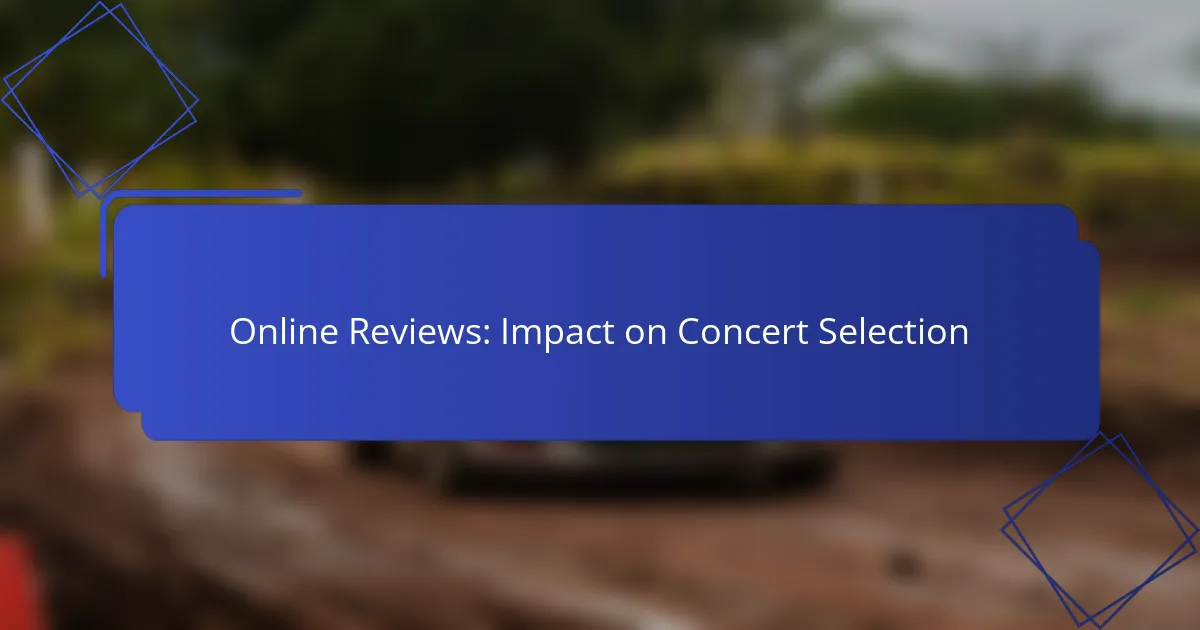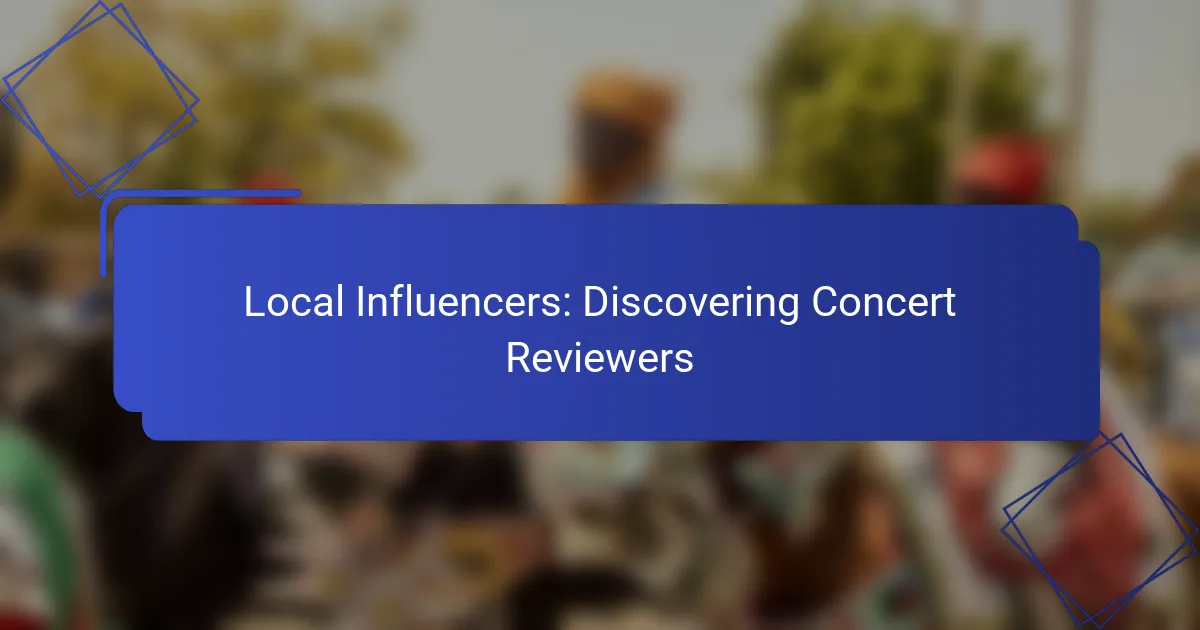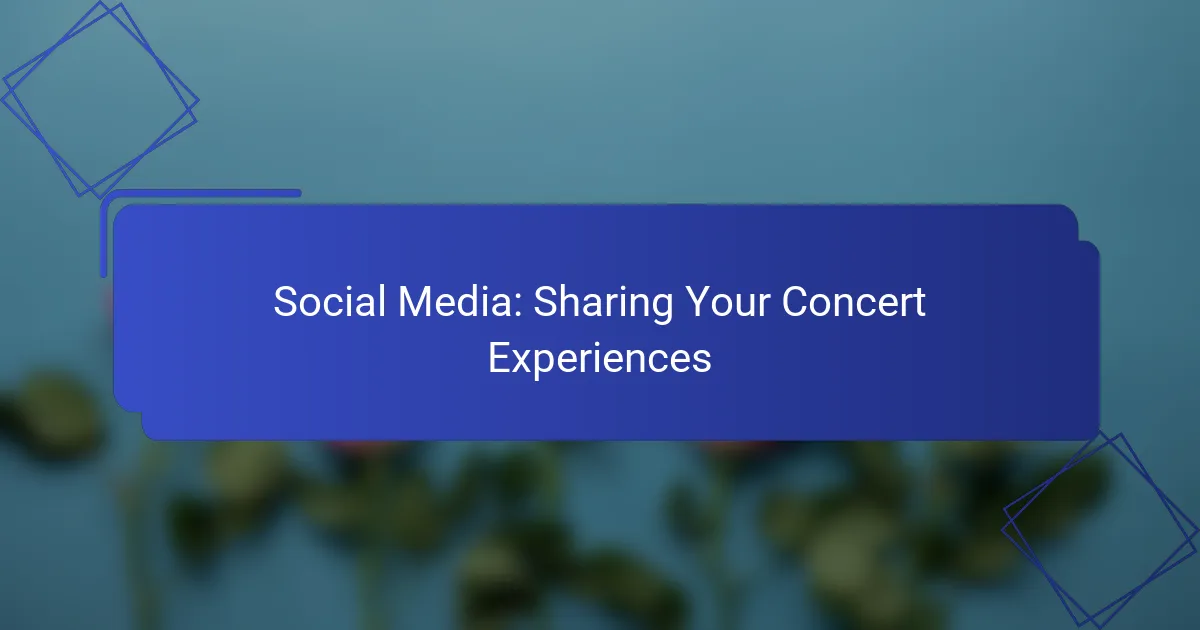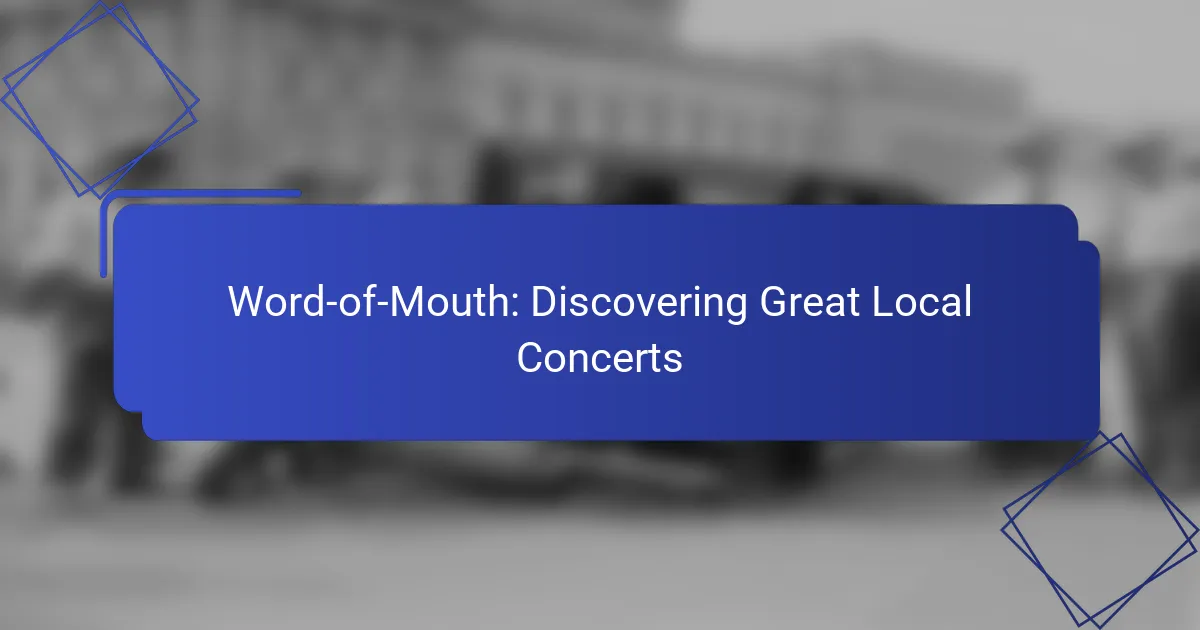Online reviews play a crucial role in concert selection, particularly in major cities, as they shape public perception and influence attendance. Potential attendees often turn to platforms like Yelp, Facebook, and Google Reviews to assess the quality of performances and the overall concert experience, allowing them to make informed decisions that align with their preferences.
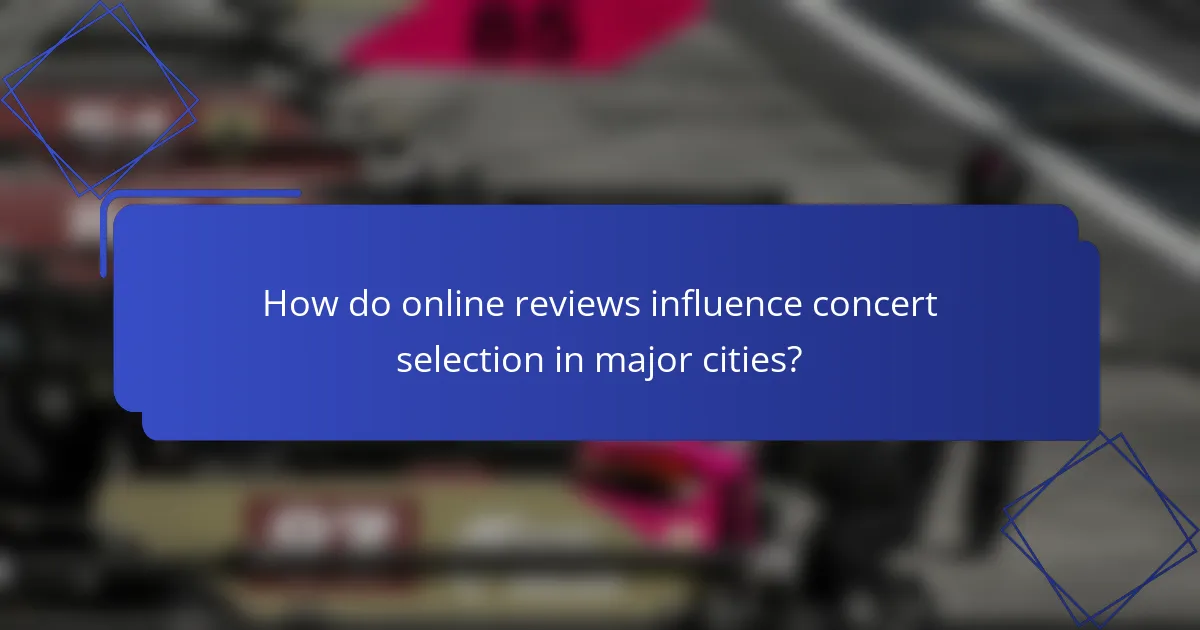
How do online reviews influence concert selection in major cities?
Online reviews significantly impact concert selection in major cities by shaping public perception and influencing attendance decisions. Potential attendees often rely on reviews to gauge the quality of performances and the overall concert experience.
Positive reviews increase attendance
Positive reviews can lead to higher attendance rates at concerts, as they create a sense of trust and anticipation among potential attendees. When fans see favorable feedback about an artist or event, they are more likely to purchase tickets, believing they will have an enjoyable experience.
For example, a concert in New York City that receives numerous glowing reviews may sell out quickly, while similar events with fewer positive comments might struggle to attract crowds. This trend highlights the importance of maintaining a good online reputation.
Negative reviews deter potential attendees
Negative reviews can significantly deter potential concertgoers, as they often highlight issues such as poor performance quality or inadequate venue conditions. A few critical comments can overshadow positive feedback, leading to decreased ticket sales.
For instance, if a concert in Los Angeles receives several complaints about sound quality or artist engagement, many fans may choose to skip the event, opting instead for alternatives with better reviews. This illustrates the need for artists and promoters to actively manage their online presence.
Reviews shape artist reputation
Reviews play a crucial role in shaping an artist’s reputation, influencing not only concert attendance but also future opportunities. A strong collection of positive reviews can elevate an artist’s status, leading to more bookings and higher ticket prices.
Conversely, persistent negative reviews can tarnish an artist’s image, making it difficult for them to attract audiences in major cities. Artists should engage with feedback, addressing concerns and promoting positive experiences to build a solid reputation in the competitive concert market.
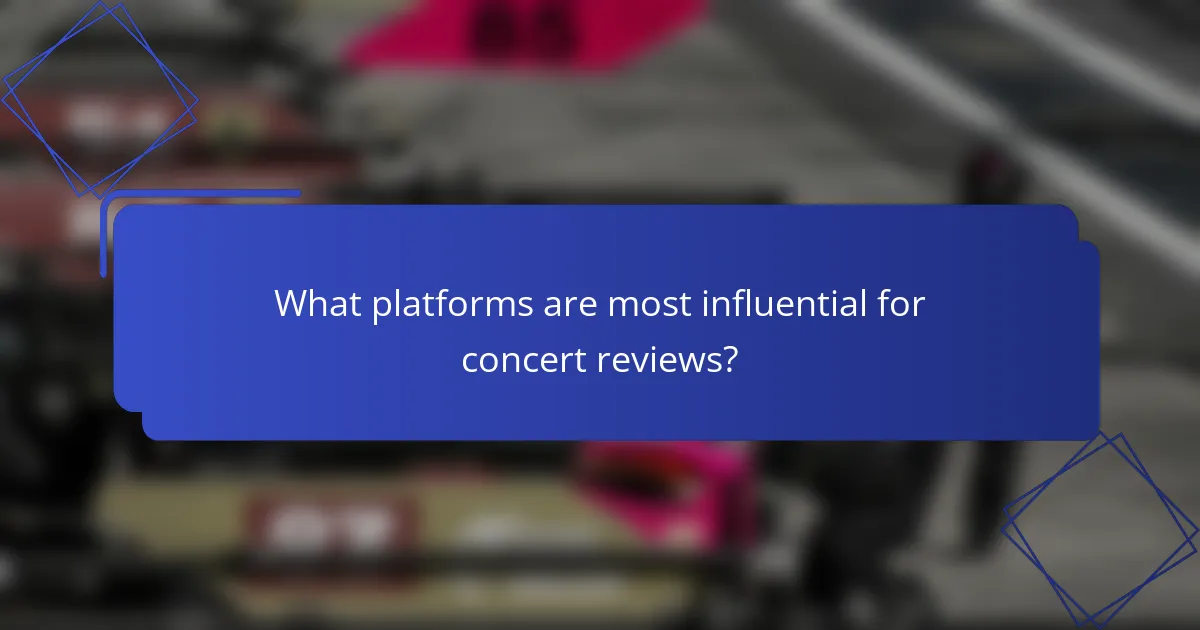
What platforms are most influential for concert reviews?
Several platforms significantly influence concert reviews, shaping audience perceptions and attendance decisions. Key players include Yelp, Facebook event pages, and Google Reviews, each offering unique features that cater to concert-goers.
Yelp as a concert review platform
Yelp serves as a popular platform for concert reviews, allowing users to share their experiences and rate performances. Concert-goers often rely on Yelp to gauge the quality of the venue and the overall concert experience.
When using Yelp, consider the number of reviews and the overall rating. A venue with a high number of reviews and a strong average rating is likely to provide a better experience. However, be cautious of overly enthusiastic or negative reviews that may skew your perception.
Facebook event pages and reviews
Facebook event pages are essential for concert reviews, as they allow attendees to leave feedback and engage with other fans. Users can see comments and ratings from friends, which can influence their decision to attend.
When exploring Facebook reviews, pay attention to the comments section for insights on the concert atmosphere and artist performance. Look for trends in feedback, such as consistent praise or criticism, to make a more informed choice about attending a concert.
Google Reviews impact on local concerts
Google Reviews play a crucial role in shaping opinions about local concerts, as they are easily accessible through search results. Many users check Google Reviews to find information about venues, artists, and past performances.
To effectively use Google Reviews, focus on the overall rating and read recent reviews for the most relevant insights. A venue with a solid rating and positive recent feedback is likely to provide a satisfying concert experience. Keep in mind that local context, such as venue size and location, can also affect the concert atmosphere and enjoyment.
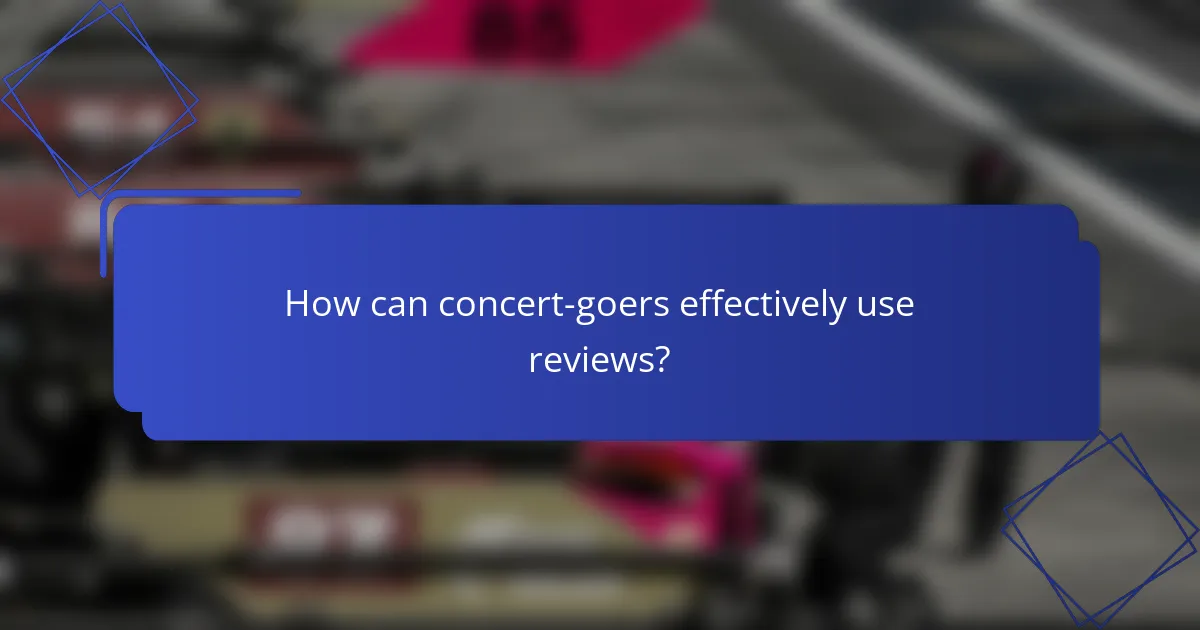
How can concert-goers effectively use reviews?
Concert-goers can enhance their event selection by leveraging online reviews to gauge the quality of performances and venues. By focusing on credible sources and understanding the nuances of reviews, attendees can make informed decisions that align with their preferences.
Identifying reliable reviewers
To find trustworthy reviews, look for reviewers with a consistent history of attending concerts and providing detailed feedback. Check their profiles for engagement levels, such as the number of reviews written and their interactions with other users.
Consider the credibility of the platform as well. Established sites like Ticketmaster or Eventbrite often feature verified attendees, while social media platforms may have a mix of genuine and biased opinions. Prioritize reviews from users who share similar tastes in music.
Comparing reviews across platforms
Different platforms can yield varying insights about a concert. For instance, a venue’s official site may highlight positive experiences, while independent review sites might present a broader range of opinions. Cross-referencing reviews helps paint a more comprehensive picture.
When comparing reviews, pay attention to the overall sentiment and specific comments regarding sound quality, crowd behavior, and venue amenities. A review that mentions a great atmosphere but poor acoustics can help you weigh your options effectively.
Understanding review context
Context is crucial when interpreting reviews. Factors such as the date of the concert, the artist’s popularity, and even the weather can influence a review’s tone and content. A concert on a rainy night may lead to more negative feedback due to logistical issues.
Additionally, consider the reviewer’s background. A casual fan may have different expectations than a die-hard enthusiast, which can affect their assessment. Look for reviews that provide context about the reviewer’s experience level and preferences.
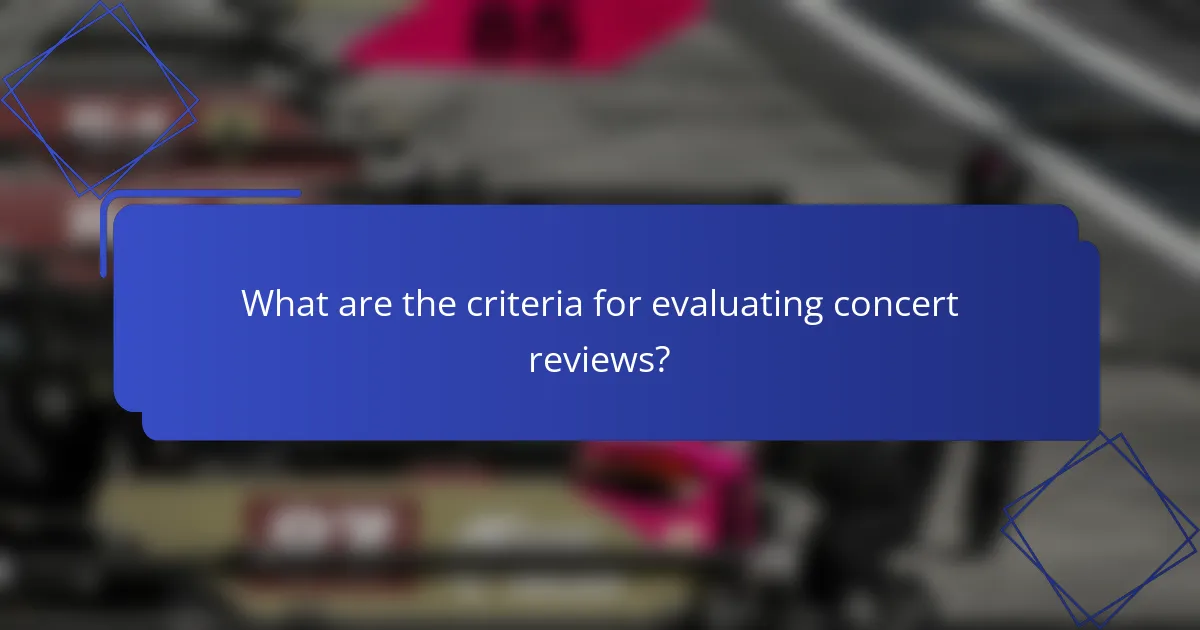
What are the criteria for evaluating concert reviews?
Evaluating concert reviews involves assessing factors like the timeliness of the review and the credibility of the reviewer. These criteria help determine the reliability and relevance of the feedback when selecting concerts to attend.
Review recency and relevance
Review recency is crucial as it reflects the most current audience experience. A review written shortly after a concert is likely to provide fresh insights, while older reviews may not accurately represent the current state of the artist or venue.
Relevance goes hand-in-hand with recency. Consider whether the review addresses the specific concert you are interested in, including details about the setlist, performance quality, and audience engagement. A review that focuses on a similar concert but not the exact one may not be as useful.
Reviewer credibility and background
The credibility of the reviewer significantly impacts the trustworthiness of the review. Look for reviewers who have a history of covering concerts or music events, as their expertise can provide valuable context and depth to their opinions.
Additionally, consider the reviewer’s background. A reviewer with a strong understanding of the genre or the artist’s history may offer insights that a casual fan might miss. Checking their previous reviews can help gauge their perspective and reliability.
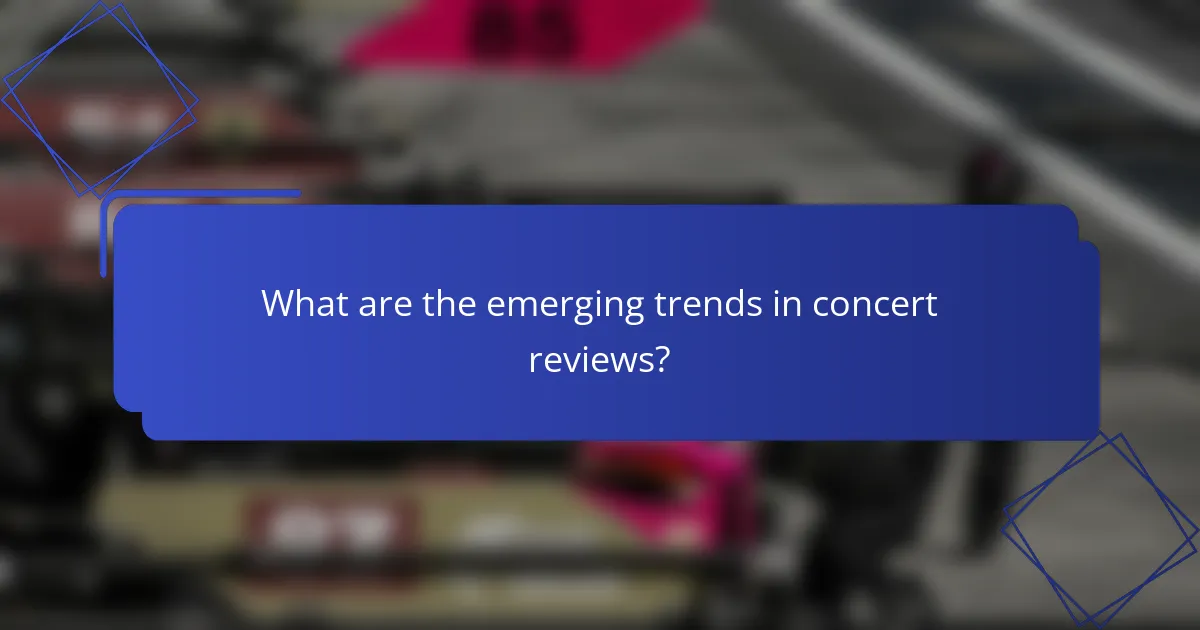
What are the emerging trends in concert reviews?
Emerging trends in concert reviews highlight the growing importance of digital platforms and user-generated content in shaping audience choices. As more concertgoers rely on online reviews, the influence of social media and video content has become increasingly significant in the decision-making process.
Influence of social media on reviews
Social media platforms like Instagram, Twitter, and Facebook play a crucial role in concert reviews by allowing fans to share their experiences instantly. Positive or negative feedback can spread rapidly, impacting the perception of an artist or event within hours.
Concert promoters and artists often monitor social media sentiment to gauge audience reactions and adjust marketing strategies accordingly. Engaging with fans online can enhance loyalty and encourage attendance at future events.
Impact of video reviews on concert selection
Video reviews, particularly on platforms like YouTube and TikTok, provide a dynamic way for potential attendees to experience concerts before deciding to buy tickets. These reviews often showcase live performances, crowd reactions, and overall atmosphere, giving viewers a more immersive understanding of what to expect.
When selecting a concert, many fans now consider video reviews as essential resources. They help in assessing the quality of the performance and the venue, influencing ticket purchases significantly. Artists and promoters can leverage this trend by encouraging fans to create and share video content from their shows.
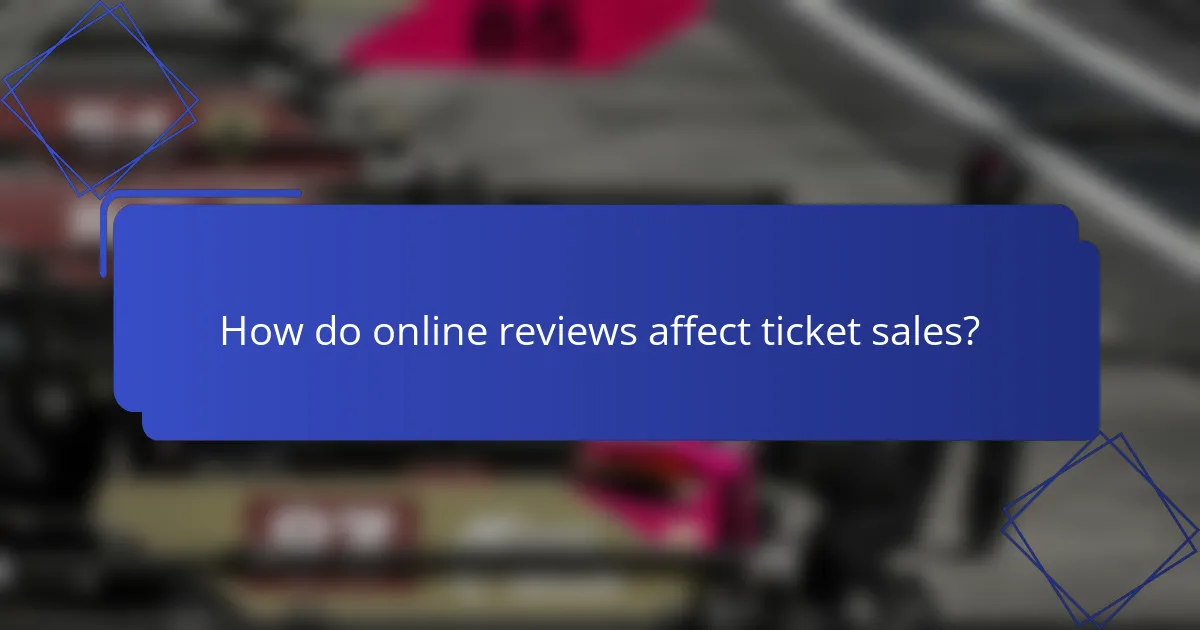
How do online reviews affect ticket sales?
Online reviews significantly influence ticket sales by shaping potential attendees’ perceptions of an event. Positive ratings can enhance demand, while negative feedback may deter purchases, making reviews a crucial factor in concert selection.
Correlation between ratings and ticket demand
There is a strong correlation between concert ratings and ticket demand. Events with higher ratings typically see increased ticket sales, as consumers often rely on the experiences of others to guide their choices. For instance, a concert rated above 4 stars may sell out faster than one rated below 3 stars.
Promoters and artists should monitor review platforms to gauge public sentiment. A concert with a rating drop can indicate potential issues, prompting organizers to address concerns proactively. This can include improving the concert experience or enhancing marketing strategies.
To maximize ticket sales, aim for consistent positive engagement with audiences. Encourage satisfied attendees to leave reviews and respond to feedback, both positive and negative, to build a strong reputation that attracts more ticket buyers.
